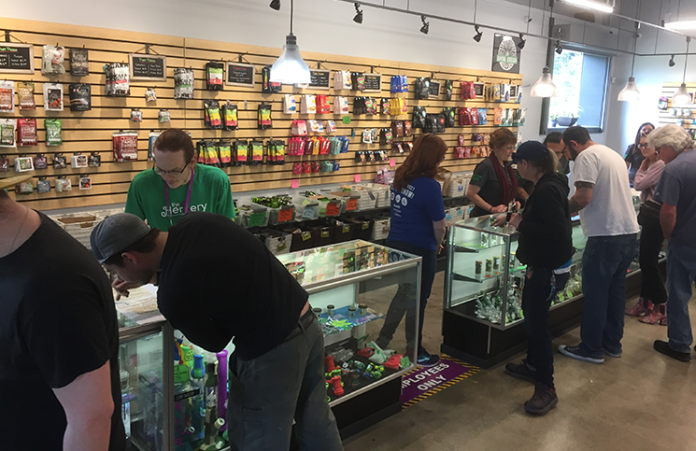
With lines out the door and customers flooding in from across the region, many Clark County cannabis shops posted record sales on the April 20 marijuana holiday known as 420.
The sales revenues, which have gone up each year since the Washington recreational cannabis industry launched in 2014, indicate that industry stigma is starting to fall away and that stores are starting to get a leg up on the black market. And even though product prices across the industry are dropping, customers bought a lot more product during the holiday to make up for the difference, local store owners said.
“It was our best 420 yet,” said Amy Elkins, owner of Mary Jane’s House of Grass. “The black market has been suppressed. I think that has brought more people into stores. It’s a safer environment where people can have more control over their experience.”
Her shop saw about four times the product sales of a regular day on April 20, with a big increase in both foot traffic and purchases. And overall, traffic has been growing at her shop even in the traditionally slow months like January and February, Elkins said.
“I think the industry is changing and becoming more socially acceptable,” Elkins said. “People are being more honest about it, and so we’re seeing foot traffic and shopping go up.”
Calista Crenshaw, owner of High 5 Cannabis, said her shop had about five times the traffic of a traditional day. The price points dropped on a lot of product, but the store made up the difference by having a lot more transactions. For the day, it had more than 1,700 customer transactions, she said.
“It was our biggest day ever,” Crenshaw said. “I think it’s taken a while for people to get comfortable going into cannabis dispensaries. But I think the stigma is starting to go away.”
Her shop had lines out the door starting at about 7 a.m., and they did not let up for most of the day, she said.
“It’s interesting on that day to talk to everyone about their shopping plan,” Crenshaw said. “We get a lot of new people in our store on 420. Everybody has a plan of action on what sales they want to hit and when they want to get to each store.”
The Herbery, which has three stores in Vancouver, also had record sales at all of its locations. Overall, the chain had about 1,000 more customers come in for the holiday than it did in 2017, said Jim Mullen, the Chief Operating Officer.
“It was excellent,” Mullen said. “Our stores were steadily busy all day long – a nice, robust, healthy flow of customers. We had some deep discounts, and our sales were double what we’d make on a normal day. We’re very happy about that.”
The Herbery’s St. John’s Road and 164th Avenue shops both posted more than twice the sales of a normal day, with its Chkalov Drive store posting about twice normal sales. The chain recently reopened its St. John’s Road store after a remodel and move to the ground floor.
The chain is also waiting for an Attorney General’s review after an underage sting at its 164th location caught employees selling to a minor. Depending on the ruling, the store at 164th could be shut down for a month, but the outcome is still pending, Mullen said.
“Surprisingly our store on 164th had the most sales,” Mullen said. “I’m glad people understand we’re not shut down there.”
Best sellers during the holiday were pre-rolled joints and cannabis flower, followed by concentrates and edibles, he said.
“Flower is still about 70 percent of everybody’s sales,” Mullen said.
Owners of Main Street Marijuana, which is the top-selling cannabis shop in the state, declined to be interviewed for this article. According to sales figures reported on the website 502data.com, Main Street Marijuana brought in $1,362,605 in sales in February of 2018. The shop has three locations – one on Main Street in downtown Vancouver, one in east Vancouver on 12th Street and one on Washington Way in Longview.
Recent changes to state law
Stores and growers also recently got a few bits of help from the state to make the flow of product move a bit more smoothly, he said.
One part of that is that the state no longer requires growers to put specific store names and UBI numbers on packaging. That means growers can bulk package product, then sell to stores as needed, rather than pre-planning each piece of product for a particular store, Mullen said.
“It’ll save millions for the producer-processors,” he explained.
The state also eliminated the need for product quarantines, which means growers can now deliver product to stores on the same day, as opposed to having to wait until the quarantine was over.
“The industry is continuing to mature,” Mullen said. “We’re still developing. But I think the state’s working to help us.”



